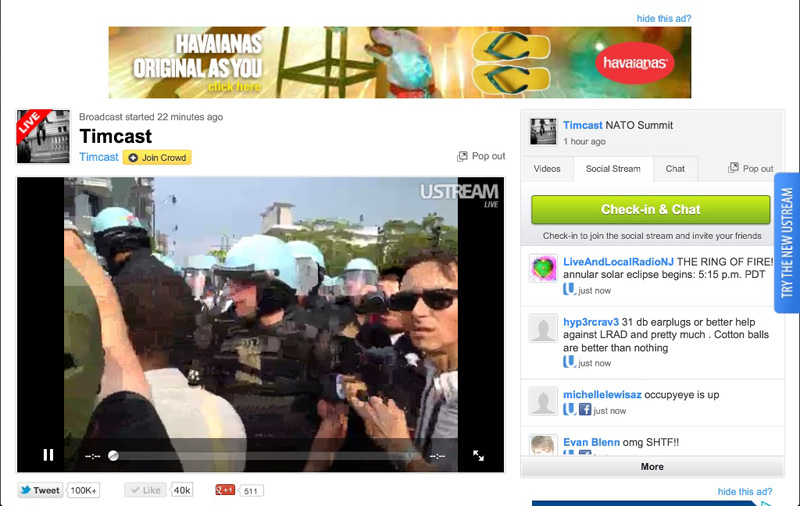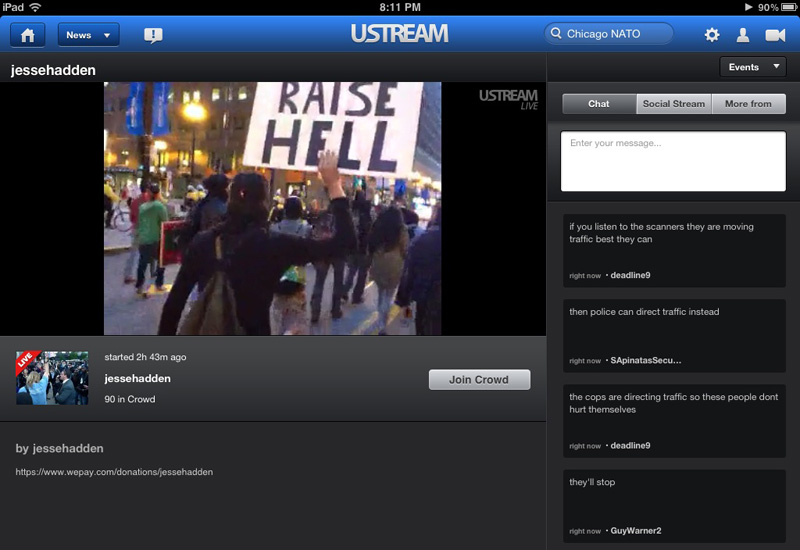
U.S. newspaper hiring data reflect a peak year of 1989, and mainstream media have been downsizing large staffs ever since. The State of the News Media 2012 report highlighted that:
•54 percent in the U.S. get news from a desktop or laptop computer
•44 percent in the U.S. own a smartphone
•18 percent of U.S. adults own a tablet device
•News via Facebook and Twitter continues to grow
The shift to online media in the past two decades comes with two important realities: (1) online revenue increases are smaller than print media decreases; and (2) mainstream media are being challenged by crowdsourcing behavior.
In the days before the New Orleans Times-Picayune announced it would follow the lead of Michigan papers and cut newspaper publication from seven to three days, the focus on less expensive online media was happening as the nature of defining news shifts because of politics and technologies.
In Chicago, for example, NATO protesters brought more than signs from Portland, New York City and other cities. A band of "streamers" -- mobile broadcasters on sites such as Ustream -- demonstrated the flexibility and durability of roving video.

The videographers, such as "Timcaster" Tim Pool, had success sending continuous video streams from inside the line of the marchers. While mainstream local television news cameras shot the confrontation from above protesters' lines, streamers captured continuous sights and sounds of protesters, police and bystanders.

Not bound by the norms of objective journalism, the streamers' commentary often included unconfirmed information and profanities. Events unfolded, according to the Chicago Tribune, as police and protesters settled into articulated boundaries of behavior:
"Police frustrated and defanged smaller groups of the most troublesome protesters while allowing peaceful demonstrators to shout and march day and night in the relative safety of the Loop, as long as they respected the boundaries police set."
Streamers played to small audiences of a few hundred -- mostly supporters or those curious about developments. While mainstream media are mostly careful to avoid rumors, there is something to be said for the crowdsourcing on Twitter via #NoNato and the multiple perspectives offered from embedded videographers. Audience members must come ready to be engaged in the work of discovering truths, but there are some missed by summary coverage.
@raypride: Tim Pool is smack in the middle of the fracas with his camera http://www.ustream.tv/timcast "Beating people with batons"
5:01 PM -- 20 May 12 via TweetDeck
The tension between police and protesters on Sunday of NATO weekend gave way to a symbiotic dance between the two sides on Monday. Protesters were allowed to march in circles through the loop area Monday night for hours, but they were kept from advancing across the Chicago River bridges and into the wealthy River North area. It was the type of visual event that attracts mainstream television and the online streamers.
As more of us look online for news and information, the readership for printed newspapers will slowly continue to shrink. So, why was Omaha billionaire Warren Buffett interested in buying the Media General chain of newspapers?
Part of the answer, as Buffett told Fox Business at the end of this interview, is the industry decision to move away from free online content and keep what is in the printed edition exclusive.
Buffett, who made some of his first money as a youngster delivering the Washington Post, still values the 1973 Pulitzer Prize in investigative reporting that he helped win as owner of the Omaha Sun. Yet, a decade later the doors of the Sun closed. Although Buffett has long understood the newspaper business, he has never let his love for it lead him to make bad business decisions.
There are enough people desiring the feel of a newspaper to keep newspapers printing for years. Sunday newspaper editions remain very profitable. In Buffett's newspaper towns -- Omaha, Buffalo, Washington, D.C. and now Richmond -- he has said that the paper serves a distinct community need.
Grim newspaper revenue projections hide the fact that these were once such hugely profitable businesses that have a long way to fall. Movie viewing in the U.S. peaked in 1940, but the industry survived television, cable, tapes and DVDs. Maybe printed newspapers in the same way will morph into many forms providing the content to meet basic community needs.
